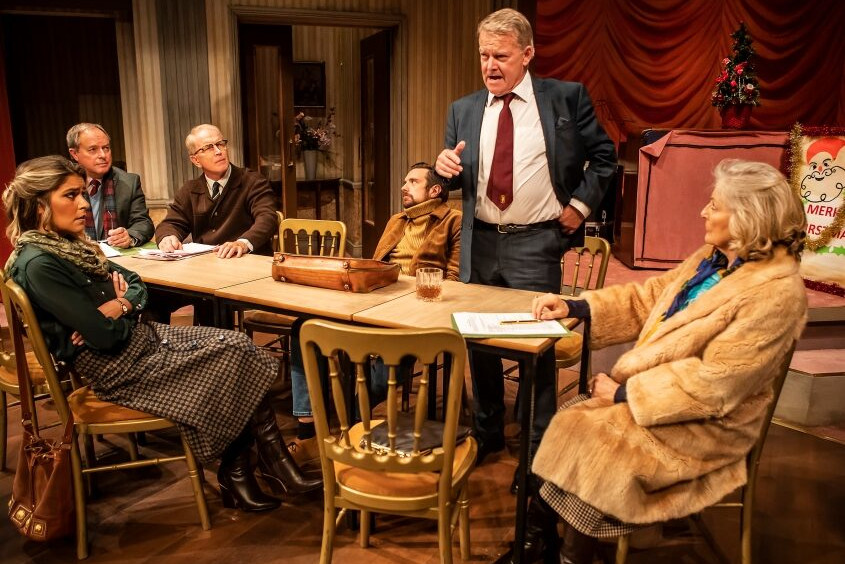
Simon Murgatroyd, Alan Ayckbourn’s archivist, writes of the playwright’s struggle to complete his first draft of Ten Times Table during the Christmas of 1976, before rehearsals were due to begin at the end of December. Ayckbourn was to confess, in his own words. “I simply can’t go on; I don’t know where we are.” It was at this crisis point that he decided to rewrite the play, in which all the action remained within the seedy ballroom of the Swan Hotel in Pendon, a small town in the throes of organising a pageant to commemorate the massacre of the Pendon Twelve, led by John Cockle, a historic people’s rising put down by a former Earl of Essex and his redcoats.
Ten Times Table is one of Ayckbourn’s trilogy of plays written during winter months in the 1970’s, the others being Just Between Ourselves and Time and Time Again. Seen together they have come to represent the period when Ayckbourne turned his focus onto social realism, finding a darker edge than in previous works.
Of these three plays, Ten Times Table is by some distance the lightest – a comedic and satirical look at the personal and political inclinations of those drawn into committee membership and the storm in a teacup that can ensue when ideological clashes start to get out of hand. Brexit has certainly given Ten Times Table renewed context with its left/right, leave/remain divides, surely contributing to the play being dusted off for another run.
Constructed around a series of meetings which start to break apart as opposing factions seem doomed to re-enact the political feuds of the past, chairman Ray (Robert Daws) and self-obsessed and ineffectual councillor Donald (Mark Curry) fail to reign in Marxist teacher Eric (Craig Gazey) who sees the pageant as an opportunity to get on his own soapbox. Meanwhile, Deborah Grant as Helen, wife of the chairman is having none of it. Modelled on a hand-bagging Margaret Thatcher, she is determined to raise a militaristic counter to Eric’s people’s uprising. Finding her man in deranged military dog-breeder Tim (Harry Gostelow), the scene is set for an ideological showdown.
Amusing asides are provided by the sometimes conveniently deaf octogenarian minute-taker Audrey (Elizabeth Power), who gets the audience onside with her enthusiastic take-up of Ray’s invitations for a drink. Her blissfully unaware piano medley rehearsal, played while mayhem ensues later is a high point.
Gemma Oaten plays the country girl, Sophie, drawn in by Eric’s rhetoric while Rhiannon Handy plays the mousy teacher, Phillipa, living with him, her tiny voice a reaction one suspects of someone living with a partner who regularly bangs the table to get their opinions across. Committee member Laurence (Robert Duncan) is mostly a sad bystander, never without a drink in hand, bemoaning his crumbling marriage.
The first half of the play suffers from a sense of rewind – consecutive committee meetings in which chairman Ray tries but fails to rule with affability, informed by Ayckbourn’s own experiences sitting in “interminable and repetitive (and largely non-productive) committee meetings” to finance and facilitate a move for his Scarborough-based theatre company in the 70’s.
A strong performance by the tweed and fur-wearing Grant ensured enough vitriol at the table, but the play’s descent into farce later in the second half, edging into panto territory, ultimately undermined the potentially more interesting opportunities afforded by the personal lives within the committee itself. ★★☆☆☆ Simon Bishop 3rd December 2019

